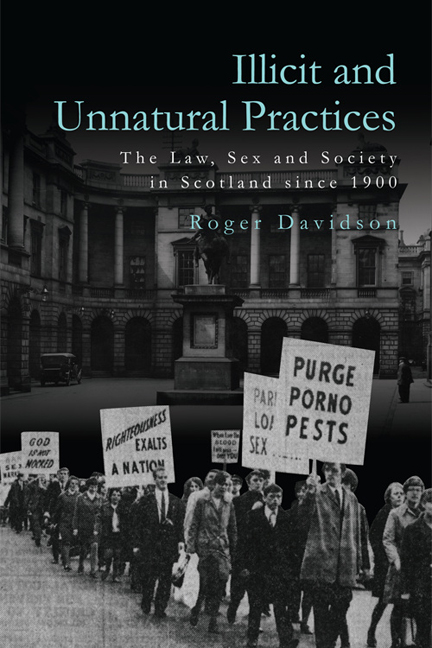Book contents
- Frontmatter
- Contents
- List of Figures and Tables
- Acknowledgements
- List of Abbreviations
- 1 Introduction
- 2 ‘Venereal Trouble’: The Case of ‘Professor’ Abraham Eastburn
- 3 ‘This Pernicious Delusion’: Law, Medicine and Child Sexual Abuse
- 4 ‘Unnatural Carnal Connection’: Bestiality and the Law in Early Twentieth-century Scotland
- 5 ‘There’s the Man who Shifts the Babies’: Abortion in the Scottish High Court, 1900−30
- 6 ‘An Open and Notorious House of Lewdness’: Dora Noyce and the Danube Street Brothel
- 7 Cure or Confinement? Law, Medicine and the Treatment of Homosexual Offenders in Scotland, 1950−80
- 8 ‘Liable or Likely to Deprave and Corrupt the Morals of the Lieges’: Sex Shops and Moral Panic in Late Twentiethcentury Scotland
- 9 ‘Culpable and Reckless Conduct’: Criminalising the Transmission of HIV in Scotland, 1983−2014
- 10 Conclusion
- Sources and Select Bibliography
- Index
3 - ‘This Pernicious Delusion’: Law, Medicine and Child Sexual Abuse
Published online by Cambridge University Press: 23 April 2021
- Frontmatter
- Contents
- List of Figures and Tables
- Acknowledgements
- List of Abbreviations
- 1 Introduction
- 2 ‘Venereal Trouble’: The Case of ‘Professor’ Abraham Eastburn
- 3 ‘This Pernicious Delusion’: Law, Medicine and Child Sexual Abuse
- 4 ‘Unnatural Carnal Connection’: Bestiality and the Law in Early Twentieth-century Scotland
- 5 ‘There’s the Man who Shifts the Babies’: Abortion in the Scottish High Court, 1900−30
- 6 ‘An Open and Notorious House of Lewdness’: Dora Noyce and the Danube Street Brothel
- 7 Cure or Confinement? Law, Medicine and the Treatment of Homosexual Offenders in Scotland, 1950−80
- 8 ‘Liable or Likely to Deprave and Corrupt the Morals of the Lieges’: Sex Shops and Moral Panic in Late Twentiethcentury Scotland
- 9 ‘Culpable and Reckless Conduct’: Criminalising the Transmission of HIV in Scotland, 1983−2014
- 10 Conclusion
- Sources and Select Bibliography
- Index
Summary
THE ‘ABOMINABLE SUPERSTITION’
In January 1913, Robert James Corbett, a 37-year-old coalminer, was indicted in the High Court, Glasgow, on a charge of raping his nine-year-old niece and of the aggravated offence of communicating to her ‘gonorrhoea and other venereal disease with which his private parts were at the time affected’. In preparation for the trial, Crown Counsel specifically requested the Procurator Fiscal to question prosecution witnesses as to ‘whether there exists a common superstition … that intercourse with a virgin is a cure for venereal disease’. The enquiry elicited a revealing consensus among medical witnesses. Dr J. M. Thompson of Aidrie responded: ‘It is a common belief among the lower classes that connection with a virgin will cure a venereal disease.’ Similarly, Dr Elizabeth Smith, Physician to Glasgow Lock Hospital, considered it to be ‘a widespread idea … in all the lower classes that contact with an untouched virgin [would] cure the disease’. The evidence of Dr James Devon, HM Prison Surgeon, was even more sweeping:
There is a curiously persistent and widespread belief that a man who suffers from venereal disease can get rid of it by having connection with a virgin. I have been surprised at discovering the existence of this belief in people generally well informed as well as among the comparatively illiterate … I have tried to find evidence for the theory that it is a belief traceable to certain districts but I have discovered it among people of different places and of different occupations − so different that now I should scarcely be surprised to come across it anywhere.
There is, of course, in Britain and elsewhere in Europe and North America, a wealth of historical evidence for the earlier persistence of such a belief, both in medical folkloreand legal discourse, normally portrayed as a superstition of the ‘lower orders’, but also frequently associated with xenophobic, if not racial, stereotyping. In twentieth-century Scotland, a range of contemporary sources echoed the testimony of the High Court prosecution witnesses that belief in the curative powers of sexual congress with a virgin as a medical strategy remained potent within medical folklore.
- Type
- Chapter
- Information
- Illicit and Unnatural PracticesThe Law, Sex and Society in Scotland since 1900, pp. 30 - 50Publisher: Edinburgh University PressPrint publication year: 2018



